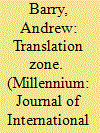| Srl | Item |
| 1 |
ID:
173372


|
|
|
|
|
| Summary/Abstract |
This paper starts from the proposition that studies of geopolitics need to address the political significance of spaces above and below the apparently twodimensional or flat surface of the land and sea. However, we depart from the view that such spaces should be defined by their verticality or conceived as three-dimensional volumes. Instead, the argument stresses the importance of attending to the relations between physical and biological things, and the ways in which the proximity of things is both mediated and supplemented by legal, and scientific and political practice. The empirical focus of the paper is a specific geopolitical puzzle. How did a short section of the route of a transnational gas pipeline, the 3500km Southern Gas Corridor, come to be a site or ‘tactical point’ at which the construction of the pipeline could be disrupted? Our contention is that any analysis of this political question must address not only the contested relations between states, corporations and civil society, but also the potential tension and interference between the horizontal networked geopolitics of pipelines and their subaquatic and subterranean construction. The subaquatic turns out not to be volume but a space of situated encounters between disparate materials.
|
|
|
|
|
|
|
|
|
|
|
|
|
|
|
|
| 2 |
ID:
123580


|
|
|
|
|
| Publication |
2013.
|
| Summary/Abstract |
This article examines the problem of how to translate actor-network theory into the field of international relations, and develops three arguments. Firstly, the article draws on Emily Apter's notion of the 'translation zone' both to rethink the concept of translation in actor-network theory and to highlight the relation between translation and politics. Secondly, the article interrogates the relation between actor-network theory and empirical research, emphasising the ways in which empirical case studies can have theoretically generative implications. Indeed, actor-network theory should not be understood as a body of theory that can be simply applied to a range of empirical examples. Finally, the article examines a number of problems that international relations poses for actor-network theory. I argue that actor-network theory needs to be adjusted and reconfigured in response to the challenge of international relations.
|
|
|
|
|
|
|
|
|
|
|
|
|
|
|
|